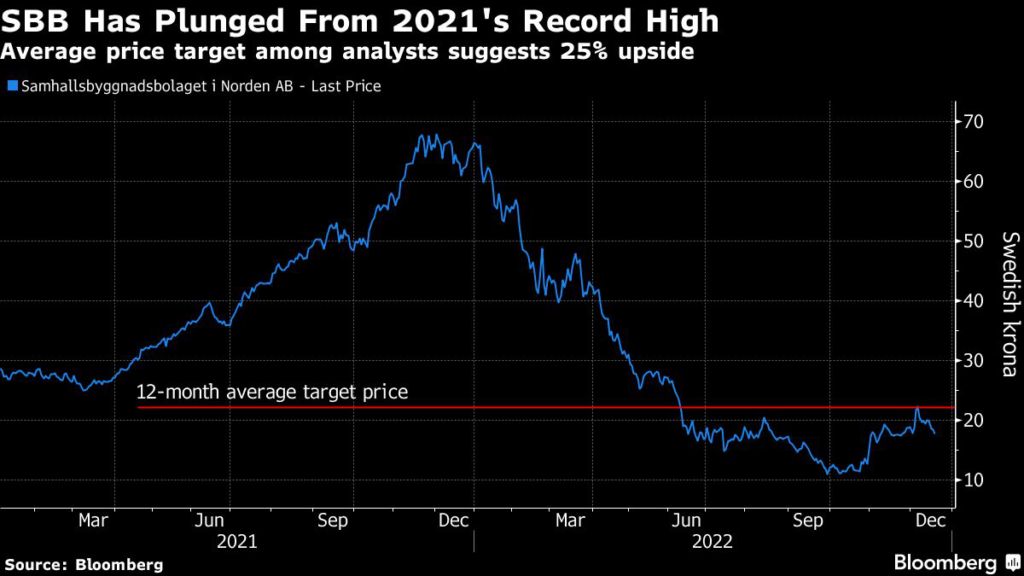In 2021, a Swedish property company was one of Europe’s top stocks. It’s ending 2022 at the very bottom of the leaderboard, with a 73% slump that underpins a sector-wide reset.
(Bloomberg) — In 2021, a Swedish property company was one of Europe’s top stocks. It’s ending 2022 at the very bottom of the leaderboard, with a 73% slump that underpins a sector-wide reset.
The reversal of fortunes for Samhallsbyggnadsbolaget i Norden AB — known as SBB — illustrates the woes of Swedish real estate stocks as they grapple with the fallout from aggressive interest rate hikes, as well as a funding squeeze amid high levels of debt. Peers including Fastighets AB Balder and Castellum AB have plunged at least 50%.
“It’s been brutal,” said Johan Henriks, who manages insurance firm Lansforsakringar’s 17.2 billion Swedish kronor ($1.7 billion) Fastighetsfond. His fund — which invests in Swedish and Nordic real estate stocks — was one of Europe’s top performing last year, with a return of 58% in local currency terms, according to Bloomberg data. It has lost 45% in 2022.
Henriks said in an interview that firms specializing in apartment rentals and shares in homebuilders may take a couple of years to find a floor, though he is more positive on commercial and industrial real estate, which often have inflation-linked rents. He’s reduced his holding in SBB, which has a diverse portfolio of residential real estate and public buildings like schools and hospitals, and the fund’s biggest holding is now warehouse firm Sagax AB.
Analysts don’t see much upside for the sector. Average price targets for the biggest Swedish real estate firms range from flat returns for Sagax over the next 12 months to an around 30% rally for Balder. But even a 30% move would only leave the shares where they traded in mid-August.
“Risk/reward in the Swedish real estate sector is still poor,” with risks to refinancing and property values outweighing low valuations, Handelsbanken analysts Johan Edberg and Oscar Lindquist wrote in note last week. Buying these stocks now is “a risky bet on rates, funding and lenders’ willingness to support companies without firm commitments on additional capitalization.”
The sector is being squeezed from all sides. While Sweden’s housing market is experiencing the worst slump among European Union countries, its real estate companies are also deeply indebted, with Moody’s Investors Service saying this month that more firms face the risk of downgrades spurred by their deteriorating debt profiles.
Underlining the negativity in the sector, SBB — which became a target for short-seller Fraser Perring’s Viceroy Research LLC this year — is among the most shorted stocks in Europe. Shares out on loan, an indication of short interest, represent about 25% of the company’s free float as of Dec. 16, according to data from S&P Global Market Intelligence. Balder, Castellum and Sagax all have an indicated short interest of more than 5%.
SBB rebutted the Viceroy allegations when they were published in February, and called on Sweden’s Financial Supervisory Authority to investigate the report.
But some analysts — such as those at Kepler Cheuvreux — are more positive, recommending buying shares in SBB, Balder and Castellum for the long term demand for real estate. In recent notes, analysts Albin Sandberg and Jan Ihrfelt also lauded efforts by some companies to either cut debt or increase their financial headroom.
SBB agreed last month to sell property worth almost $1 billion to infrastructure investor Brookfield in order to pay off debt, while it is also in the process of spinning off a part of its residential business. Balder, meanwhile, raised new equity this month to buy back a perpetual bond, easing some concerns about its debt load.
In response to the steep selloff in SBB shares, CEO Ilija Batljan cited the Brookfield deal, and said it shows “there is no connection between our share price and how our assets are priced.” SBB’s 12-month forward price-to-book ratio — comparing its share price to the book value of its assets — is 0.45 times, lower than the Stoxx 600 Real Estate subindex, which trades at 0.67 times.
Balder and Castellum didn’t respond to emailed requests for comment.
There’s almost certainly more volatility ahead. “Given the depressed share valuations and general uncertainty regarding property values and funding terms, we expect even small changes in market conditions to continue have a large impact on share prices,” the Handelsbanken analysts said.
–With assistance from Anton Wilen.
More stories like this are available on bloomberg.com
©2022 Bloomberg L.P.










